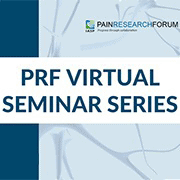Editor’s note: This seminar is the latest event in a series of seminars launched in May 2020 to help keep the pain research community connected during the COVID-19 pandemic and to provide all members of our community with virtual educational opportunities. The seminar series is supported by the Center for Advanced Pain Studies at the University of Texas at Dallas, US.

The IASP Pain Research Forum hosted a seminar with Jane Hartung, PhD, and Jamie Moy, PhD, both of the University of Pittsburgh, US, on Monday, January 25, 2021, from noon-1:15 p.m. Eastern Standard Time (US)/5-6:15 p.m. GMT/6-7:15 p.m. CET. A Q&A session moderated by William Renthal, MD, PhD, Brigham and Women’s Hospital and Harvard Medical School, Boston, US, followed the presentation.
A recording of the seminar is available on IASP's Pain Education Resource Center (PERC) here.
Here is an abstract from the presenters
Despite the growing number of biological targets for the treatment of pain implicated in preclinical studies, few of these targets have translated into effective strategies to relieve pain. Amongst the myriad potential reasons for this alarmingly high failure rate is that preclinical animal models used to discover pain targets and validate novel therapies are not sufficiently similar to people. For this reason, a number of labs are incorporating the use of human tissue from organ donors to validate therapeutic targets. In this seminar, members of Dr. Michael Gold’s lab (University of Pittsburgh) will discuss how using human dorsal root ganglion (DRG) neurons is critical for the successful development of pain therapeutics. Dr. Jamie Moy will present first by giving a brief overview of similarities and differences found between rodent and human DRG neurons. Next, she will discuss ways/approaches to maximizing the use of human tissue, including neurons, to generate model systems on which to perform hypothesis-generating and -testing research directed at pain treatments. Dr. Jane Hartung will continue the conversation by presenting her work characterizing voltage-gated calcium channels in human DRG neurons and their regulation by a variety of factors including age, Gi-protein inhibition, and temperature. Moy's and Hartung’s findings highlight important similarities and differences between species that speak to potential therapeutic failures, if not new avenues for success. With consent from the next of kin, tissue from organ donors in research provides a valuable resource to ensure a successful translation of therapies for pain patients.
About the presenters
Jamie Moy, PhD, received her doctorate from The University of Texas at Dallas in Dr. Theodore Price’s lab. Her dissertation focused on mRNA translation with an emphasis on a single phosphorylation event at the cap-binding protein, eIF4E. With a drive to learn electrophysiology specifically in human DRG neurons, Dr. Moy joined the Gold lab in January 2018. Her current research focuses on activity-dependent nociceptor sensitization. Her work was funded by an NINDS T32 and F32 postdoctoral fellowship. You can follow her on Twitter @jamiekmoy.
Jane E. Hartung, PhD, is a postdoctoral fellow at the University of Pittsburgh working in the laboratory of Dr. Michael Gold. Dr. Hartung earned a BS in biology at Furman University and a PhD in neurobiology at the University of North Carolina in the laboratory of Dr. Andrea Nackley (Duke University). Her current research uses patch clamp electrophysiology and calcium imaging techniques to characterize voltage-gated ion channels and their regulation in human sensory neurons. Her work has been supported by an NIAMS F31, an NINDS T32, and an NINDS F32. You can find her on Twitter @janehartung or at her website.
About the moderator
William Renthal, MD, PhD, is the director of research at the John R. Graham Headache Center at Brigham and Women’s Hospital and an assistant professor of neurology at Harvard Medical School. He completed his MD, PhD, and neurology residency at the University of Texas Southwestern Medical Center, headache medicine fellowship at Brigham and Women’s Hospital, and postdoctoral research training with Dr. Michael Greenberg at Harvard Medical School. Dr. Renthal treats patients with refractory headache disorders and directs a research laboratory that studies the genetic and epigenomic mechanisms underlying headache and pain disorders. He has published over 40 peer-reviewed articles and book chapters, and recently received the Career Award in Medical Sciences from the Burroughs Wellcome Fund and the Harold Wolff-John Graham Pain Research Award from the American Academy of Neurology.
Join the conversation about the seminar on Twitter @PainResForum #PRFSeminar
We thank the Center for Advanced Pain Studies at the University of Texas at Dallas, US, for its support of the PRF seminar series.



